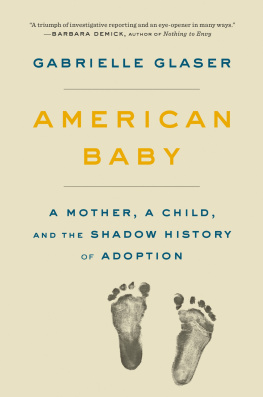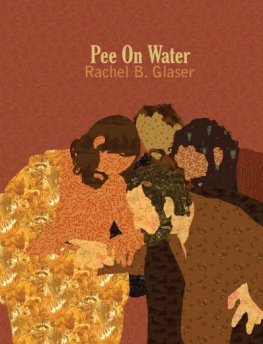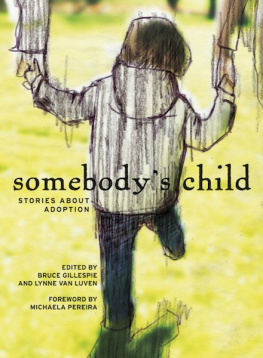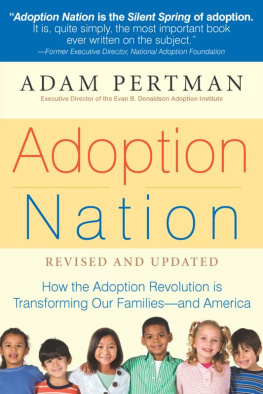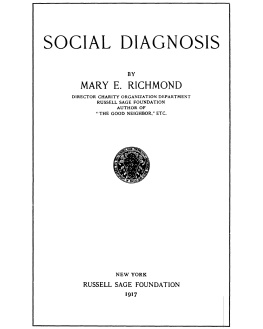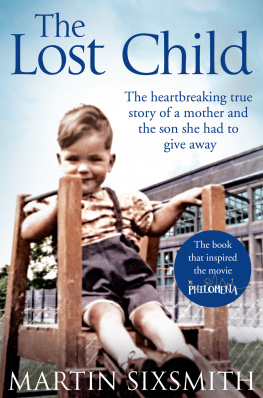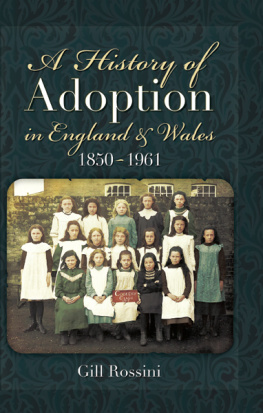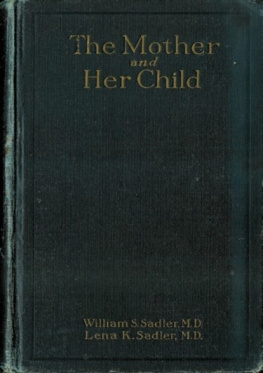Gabrielle Glaser - American Baby: A Mother, a Child, and the Shadow History of Adoption
Here you can read online Gabrielle Glaser - American Baby: A Mother, a Child, and the Shadow History of Adoption full text of the book (entire story) in english for free. Download pdf and epub, get meaning, cover and reviews about this ebook. year: 2021, publisher: Penguin Publishing Group, genre: Non-fiction. Description of the work, (preface) as well as reviews are available. Best literature library LitArk.com created for fans of good reading and offers a wide selection of genres:
Romance novel
Science fiction
Adventure
Detective
Science
History
Home and family
Prose
Art
Politics
Computer
Non-fiction
Religion
Business
Children
Humor
Choose a favorite category and find really read worthwhile books. Enjoy immersion in the world of imagination, feel the emotions of the characters or learn something new for yourself, make an fascinating discovery.
- Book:American Baby: A Mother, a Child, and the Shadow History of Adoption
- Author:
- Publisher:Penguin Publishing Group
- Genre:
- Year:2021
- Rating:5 / 5
- Favourites:Add to favourites
- Your mark:
- 100
- 1
- 2
- 3
- 4
- 5
American Baby: A Mother, a Child, and the Shadow History of Adoption: summary, description and annotation
We offer to read an annotation, description, summary or preface (depends on what the author of the book "American Baby: A Mother, a Child, and the Shadow History of Adoption" wrote himself). If you haven't found the necessary information about the book — write in the comments, we will try to find it.
American Baby: A Mother, a Child, and the Shadow History of Adoption — read online for free the complete book (whole text) full work
Below is the text of the book, divided by pages. System saving the place of the last page read, allows you to conveniently read the book "American Baby: A Mother, a Child, and the Shadow History of Adoption" online for free, without having to search again every time where you left off. Put a bookmark, and you can go to the page where you finished reading at any time.
Font size:
Interval:
Bookmark:
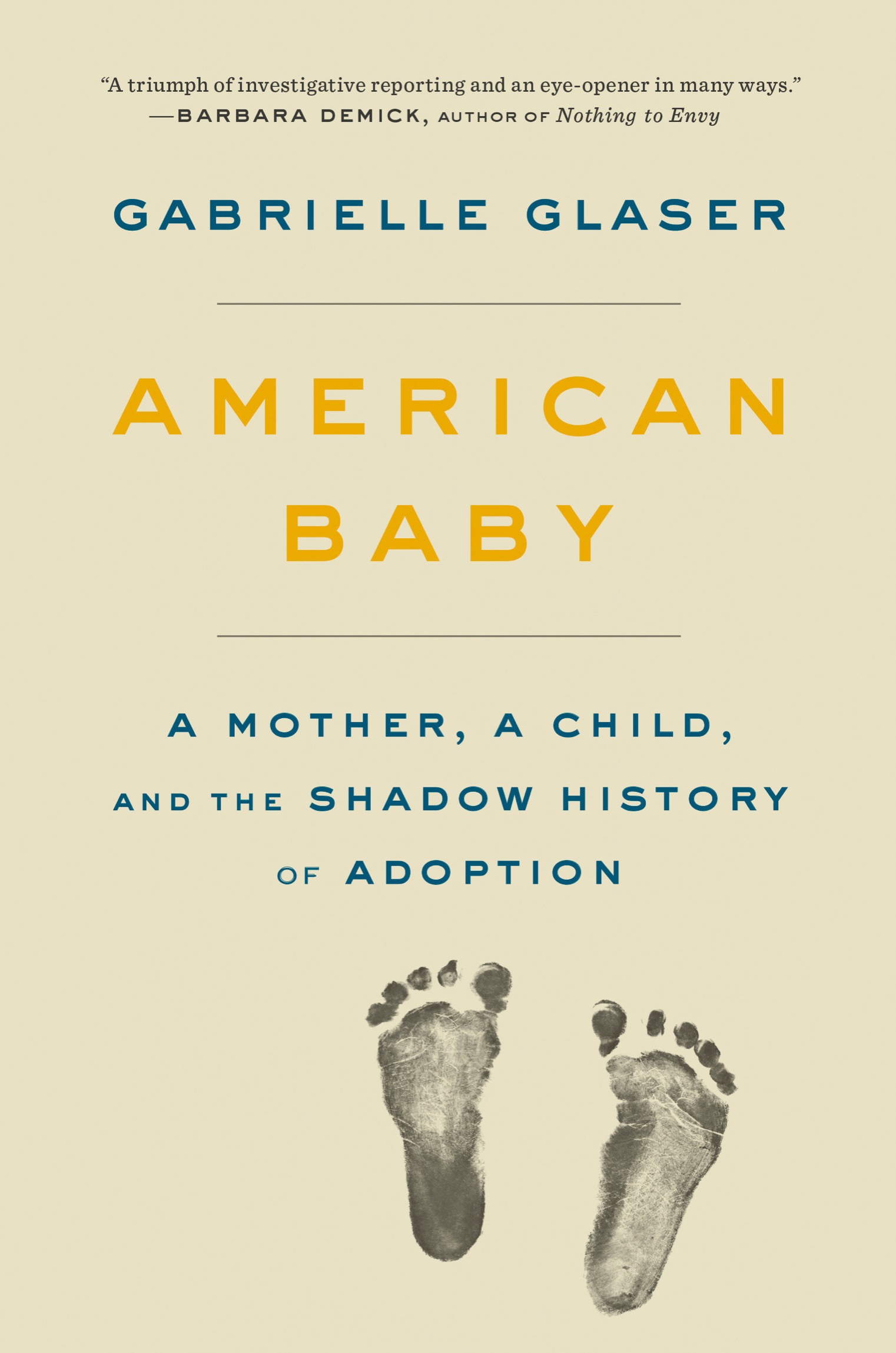
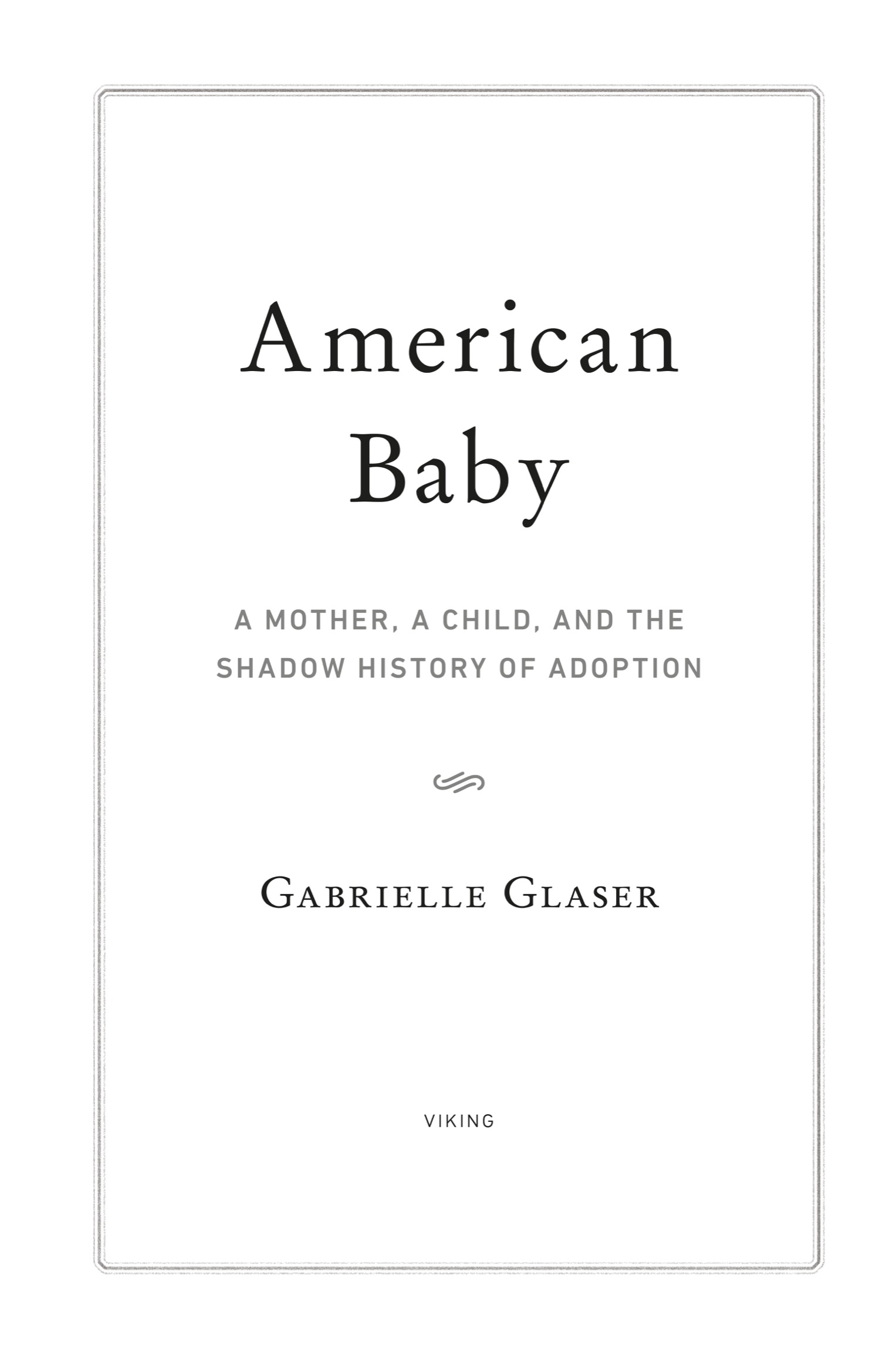
VIKING
An imprint of Penguin Random House LLC
penguinrandomhouse.com
Copyright 2021 by Gabrielle Glaser
Penguin supports copyright. Copyright fuels creativity, encourages diverse voices, promotes free speech, and creates a vibrant culture. Thank you for buying an authorized edition of this book and for complying with copyright laws by not reproducing, scanning, or distributing any part of it in any form without permission. You are supporting writers and allowing Penguin to continue to publish books for every reader.
Photos: courtesy of Margaret Katz
Photos: courtesy of Kim Rosenberg
Library of Congress Cataloging-in-Publication Data
Names: Glaser, Gabrielle, author.
Title: American baby : a mother, a child, and the shadow history of adoption / Gabrielle Glaser.
Description: New York : Viking, 2020. | Includes bibliographical references and index.
Identifiers: LCCN 2020005338 (print) | LCCN 2020005339 (ebook) | ISBN 9780735224681 (hardcover) | ISBN 9780735224698 (ebook)
Subjects: LCSH: Rosenberg, David, 19612014. | Katz, Margaret Erle. | Adopted childrenUnited States. | AdoptionUnited StatesHistory20th century. | Adoption agenciesCorrupt practicesUnited StatesHistory20th century. | Teenage mothersUnited StatesSocial conditions20th century. | BirthparentsIdentification.
Classification: LCC HV875.55 .G59 2020 (print) | LCC HV875.55 (ebook) | DDC 362.734092 [B]dc23
LC record available at https://lccn.loc.gov/2020005338
LC ebook record available at https://lccn.loc.gov/2020005339
pid_prh_5.6.1_c0_r0
To Margaret, to David, and to all families separated by a culture of secrecy
Prologue
I met David Rosenberg for the first time on a rainy spring afternoon in 2007, at a dialysis center just outside Portland, Oregon. He was sitting in a beige vinyl chair, tethered to the machine cleaning his blood. I was working on an article for the local paper about the kidney transplant David was soon to undergo, thanks to the organ donation from a friend. We had spoken on the phone to arrange the interview, and I was surprised that David suggested we meet for the first time in what felt like such an intimate setting. He immediately disarmed me with his sense of humor: Are you kidding? Im stuck there for four hours three times a week, he said. Its not like I could be out doing errands. When asked how I would find him, he laughed out loud. Im the olive-skinned bald Jewish guy with glasses, he said. Cant miss me.
Davids description was accurate, and in the crowd of mostly quite-pale descendants of Scandinavians, he was easy to spot. Within a moment of my sitting down, we started playing Jewish Geography, the game in which Jews who meet each other for the first time try to identify people they have in common. Even before I took out my notebook, it was clear he wanted to be forthcoming. Maybe it was that dialysis centers, sitting so squarely at the intersection between life and death, arent conducive to small talk.
The kidney donation tale was uplifting, and I planned to follow David, his friend and donor, Marshal Spector, and their families for an article about the Jewish concept of tikkun olamhealing the worldthat would run just before the Jewish New Year, four months away. But as David began to talk, I realized that the story was deeper. Many living organ donors are family members, but David had been adopted as an infant and had no known relatives who could give him a kidney. A cantor in a large Portland synagogue, he was beloved, and many people in his tight-knit community had stepped up to offer theirs. Doctors had decided the best match was Marshal. Early in their relationship, theyd discovered an uncanny connection: Marshals great-grandfather had been a rabbinical teacher of Davids adoptive father in a Romanian city before World War II.
As a clergyman, David presided over deeply personal events, participating in his congregations greatest joys and deepest sorrows. Especially private ones, he said, tapping his broad chest proudly. I wondered where our chat was headed. I was there as a reporter, not a confidante, and my job was to take down everything he said in the notebook on my lap. Dialysis centers are loudthe machines whizz and whir incessantly, and its hard to hear above the noise. He moved toward me as if to convey something intimate.
David told me he had another motive for wanting to publicize his circumstances. These were still early days for social media, but homemade videos and links to newspaper articles had started to go viral, and David hoped the story about two guys on the Western frontier whose ties stretched back to the old country would circulate among Jews nationwide. He knew only one detail about his own past, he said: in 1961, the year he was born, his mother had been a Jewish girl in trouble in New York City. He paused for a moment, and looked away.
His wish was that somewhere on the vast Internet, she would see his black eyes, his thick, strong hands, cleft chin, and broad smile, and recognize him as her son.
David wasnt looking for new parents; the couple who adopted him after surviving the Holocaust loved him deeplyand he themand gave him every advantage. Both had died long ago, and David didnt feel he was betraying their love by trying to discover more about his identity, medical history, and the woman who, as he put it, gave him up. I want to know more, he told me that day. He pointed to the blood-filled tubes that crisscrossed his body. You know, for my kids.

Over the next year, I grew close to David, his wife, Kim Danish Rosenberg, and Marshal. I got to know their children. After I moved from Portland to New Jersey in 2008, we stayed in touch and visited occasionally when I returned to Oregon to see my family. Things with David werent good: Despite the new kidney, his health was failing. Just months after the transplant, he had been diagnosed with a lethal form of thyroid cancer. One time when I met him at a hipster coffee shop in Portlandwhere he walked in carrying his own Diet Cokehe told me he was still hoping to find some relatives. He just didnt know how.
As the years passed, Davids interest in finding his biological mother, even as he was running out of timeespecially as he was running out of timenever really left my mind. I understood how difficult it would be for him to find her, given that the laws in New York, like in many other states, kept the original birth certificates of adoptees closed, meaning that only state officials and adoption agency social workers were allowed to see them. Years before, David had inquired briefly about his adoption, but learned that searching would require the written permission of his adoptive parents, who had already died. That brief interaction was enough to confirm Davids suspicions that he was unwanted. So, perhaps fearing more rejection, he let it go. We didnt really talk about it, and it seemed too painful for me to ask. I wasnt a journalist covering him any longer; Id become his friend. Yet whenever I was in Manhattan, Id find myself absentmindedly looking at Jewish grandmothers on the bus, in supermarkets: Could that be her?

Font size:
Interval:
Bookmark:
Similar books «American Baby: A Mother, a Child, and the Shadow History of Adoption»
Look at similar books to American Baby: A Mother, a Child, and the Shadow History of Adoption. We have selected literature similar in name and meaning in the hope of providing readers with more options to find new, interesting, not yet read works.
Discussion, reviews of the book American Baby: A Mother, a Child, and the Shadow History of Adoption and just readers' own opinions. Leave your comments, write what you think about the work, its meaning or the main characters. Specify what exactly you liked and what you didn't like, and why you think so.

